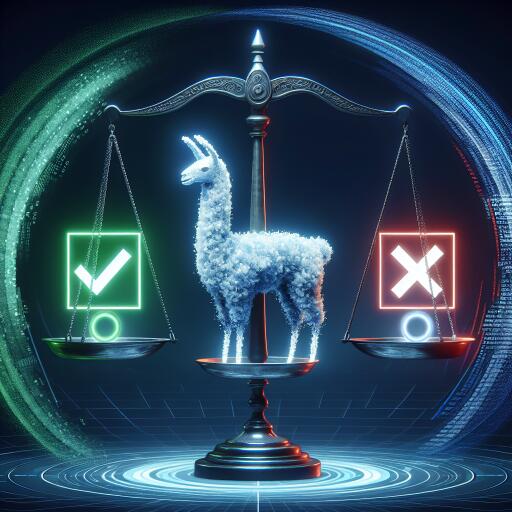Ethical Pros and Cons of Meta’s Llama 3 Open-Source AI Model
The unveiling of Meta’s latest large language model (LLM), Llama 3, marks a significant milestone in the advancement of artificial intelligence (AI). Yet, as we delve deeper into the possibilities this open-source model presents, a broader, more critical conversation emerges about its implications on the landscape of ethical AI development. There are layers to unpack in evaluating the safety and consequences of making such powerful AI technologies widely accessible at this stage.
Experts in the field are divided, providing insightful perspectives on the potential benefits and pitfalls of open-sourcing AI like Llama 3. On one hand, this approach may significantly accelerate innovation in AI, opening up avenues for research, collaboration, and development at an unprecedented scale. On the other hand, it poses substantial risks, including the proliferation of deepfakes and other harmful technologies that could have severe societal impacts.
The Driving Forces Behind Open Source AI
One of the most compelling arguments in favor of open-sourcing AI technology like Llama 3 is the promotion of transparency. By allowing researchers, developers, and the general public to scrutinize the code, models, and datasets used in its training, open-source AI fosters an environment of collective oversight and accountability. This transparency can lead to more robust discussions about AI ethics, potential biases in AI systems, and ways to mitigate these risks ahead of time.
Moreover, the open-source model encourages a democratization of AI technology. It enables a wider range of stakeholders to participate in AI development, potentially leading to innovative applications that benefit society at large. In contrast, AI developed within closed, proprietary systems may limit the scope of innovation to the priorities and values of a select few companies.
Addressing The Ethical Risks
However, with the power of open-source AI comes a significant responsibility to address its ethical ramifications. The ability to freely access and modify Llama 3’s underlying code could inadvertently facilitate the creation of technology that infringes on individuals’ privacy, spreads misinformation, or exacerbates societal inequalities through biased algorithms. The very nature of open-source software means that once it’s released into the wild, controlling its use becomes exponentially more challenging.
Instances of AI misuse, such as the development of deepfake technology, underscore the urgency of establishing ethical guidelines and regulatory frameworks for open-source AI. Leaders in the field are calling for a delicate balance between fostering innovation and ensuring that AI technologies are developed and deployed in ways that are safe, ethical, and beneficial for society as a whole.
Learning From Mistakes and Moving Forward
The case of OpenAI’s Sora AI video creation tool serves as a cautionary tale. When questions arose about the tool’s training data and processes, the lack of transparency did little to assuage concerns about bias and ethical development. This incident highlights the importance of open dialogue and accountability in the AI community, especially as technologies like Llama 3 become increasingly central to our digital lives.
In conclusion, the debate around Meta’s open-source Llama 3 model is not just about the technical merits of the AI itself but about how the tech community chooses to navigate the ethical minefield that accompanies the democratization of powerful AI technologies. The move towards open sourcing AI has the potential to enhance innovation, transparency, and public trust. Yet, it also demands a concerted effort from stakeholders across the spectrum to address the ethical challenges head-on, ensuring that AI development is aligned with the greater good. As we stand on the brink of this new frontier, the choices made today will reverberate through the future of AI development and its impact on society.










